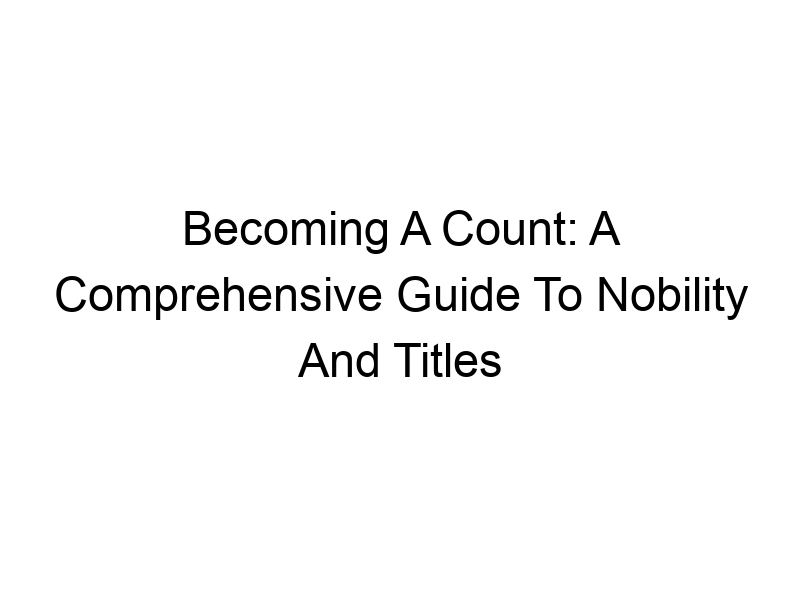Ever wondered how someone becomes a Count? This in-depth guide explores the fascinating world of titles of nobility, delving into the history, the modern realities, and the various paths one might take to achieve this prestigious title. We’ll cover everything from the historical context of counts and countesses to the modern-day acquisition of such titles, ensuring a clear understanding of how to become a count. Learn about the different routes to nobility, the implications of holding such a title, and the rich history behind this centuries-old tradition.
The title of “Count” (or “Earl” in English-speaking countries) has a long and rich history, dating back to the Roman Empire. Originally, counts were appointed officials responsible for administering a specific region or “county.” Over time, the title evolved, becoming hereditary and
linked to the aristocracy. The power and influence associated with the title varied considerably depending on the specific time period and geographical location. In some regions, counts held significant political and military authority, while in others, their power was more ceremonial. The power and influence of a Count varied across historical periods and geographic locations. For example, a Count in the Holy Roman Empire might wield considerable power, while a Count in a smaller principality might have a more limited role.
The Modern Meaning of a Count
Nobility and Hereditary Titles
In modern times, the title of Count typically signifies membership in the aristocracy, a hereditary title passed down through generations. However, the significance and legal weight of the title vary considerably across different countries and jurisdictions. In some countries, such as certain European nations, the title might retain some legal privileges or recognition, while in others, it’s primarily a social distinction.
The Legal and Social Implications of the Title
Holding a title like Count carries both social and, in some cases, legal implications. Socially, it’s often associated with prestige, access to certain circles, and a sense of history and heritage. Legally, the implications are highly dependent on the jurisdiction. Some countries might grant specific rights or privileges to titled individuals, while others may not accord any special legal standing. This necessitates understanding the specific legal frameworks of different regions.
Paths to Becoming a Count
Inheritance: The Traditional Route
The most traditional way to become a Count is through inheritance. If your family lineage includes a Count or a Countess, and the title is hereditary, you would likely inherit the title upon the death of the previous holder. The specific rules of succession vary depending on the country and the specific family’s traditions. For example, primogeniture—the right of the eldest son to inherit—has been common practice, though this is changing in many contexts today.
Marriage: Acquiring a Title Through Spousal Lineage
Another path is through marriage. If you marry a Countess or a Count, you may acquire a courtesy title, often the same as your spouse’s title, though often you would not be officially styled as a Count. This is a form of social recognition and an acknowledgment of your connection to the titled family. It is important to note that the ability to use this courtesy title and its social implications differ across various social and geographic contexts.
Papal Creation: A Less Common Path
Historically, the Pope could bestow titles of nobility. While less common in modern times, this path remains a possibility. It is important to note that this process is exceedingly rare and would involve a complex series of approvals and processes within the Catholic Church. Such an event is unusual, and generally associated with a highly recognized individual.
Exploring Alternative Titles and Honors
Understanding Similar Noble Titles
The hierarchy of nobility varies by country and often involves a number of similar titles, such as Duke, Marquis, Earl, Baron and others. Each title holds a specific rank within the nobility, with Dukes generally ranking higher than Counts. Understanding these distinctions is essential to accurately comprehend the social hierarchy and the different levels of prestige associated with each title.
The Challenges and Limitations
The Financial Burden of Maintaining a Title
Maintaining a title of nobility can be quite expensive. Historic estates, upkeep of properties, and the cost of upholding a certain lifestyle can create significant financial burdens. It’s not uncommon for titled individuals to face financial pressures, requiring careful management of resources.
Social Expectations and Obligations
Becoming a Count also comes with significant social expectations and obligations. You’ll likely be expected to participate in various social events, charitable work, and maintain a certain public image. These social demands require a degree of commitment and can be time-consuming.
Modern-Day Perceptions of Nobility
The Changing Social Landscape
The social relevance of nobility has changed dramatically over time. In many countries, titled individuals may still hold significant social prestige and influence, while in others, the relevance of titles has diminished, becoming more of a historical curiosity or a family legacy. The social significance of nobility in different parts of the world is highly varied.
FAQs
What are the legal rights associated with being a Count?
The legal rights associated with being a Count vary significantly depending on the country. In some countries, there might be specific legal privileges or exemptions, while in others, the title holds no particular legal significance beyond social recognition.
Can I buy a title of nobility?
While some organizations claim to sell titles, it is generally advisable to treat such claims with caution. Legitimate hereditary titles cannot be bought or sold. Titles of nobility generally pass down through family lineages, with some exceptions such as papal creation. Organizations offering to sell nobility titles are often fraudulent.
What are the financial implications of maintaining a noble title?
Maintaining a noble title often comes with considerable financial burdens. This is due to the maintenance of historic properties, upkeep of estates, and the expectation of maintaining a certain social standing which often necessitates substantial financial resources.
Is there a process to apply for a title of nobility?
The process of applying for a title of nobility varies widely depending on the jurisdiction and the specific title in question. In many European countries, there are established procedures and governing bodies that oversee such matters. However, acquiring a recognized title is usually based on lineage and/or direct appointment by a head of state.
Final Thoughts
Becoming a Count is a complex undertaking, fraught with historical context, legal intricacies, and social expectations. This journey is less about a specific application process and more about lineage, legacy, and the careful stewardship of a title that carries centuries of history. While the allure of the title remains, understanding the financial burdens, social expectations, and legal realities is crucial. Whether inherited, acquired through marriage, or potentially through a papal creation, the path to becoming a Count involves more than just a title; it is about embracing a rich legacy and upholding its traditions.

